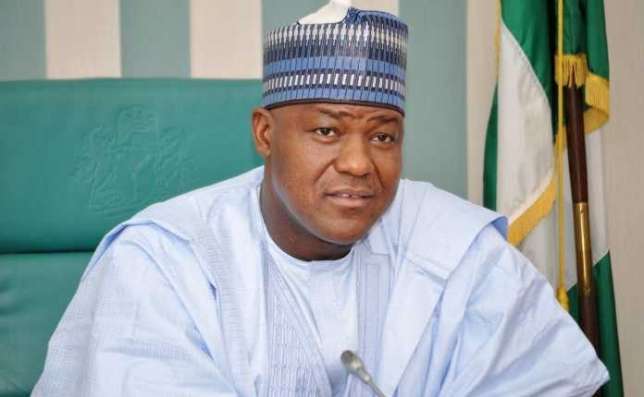A former Speaker of the House of Representatives, Yakubu Dogara has said Nigerians seem to have accepted mass killings in the country as the new normal.
Dogara, in a key note address titled, “Peace and Development in Nigeria: The Pragmatic Approach,” delivered at a summit organised by the Sultan Maccido Institute for Peace and Development Studies, University of Abuja, lamented that such killings no longer made headlines, adding that the situation had created a feeling that “nothing matters anymore.”
He said: “Today, Nigeria is faced with unprecedented crisis, so much so that nothing in our history prepares us for such a time as this. We seem to have accepted killings and mass murder as our new normal and so many cold-blooded murders of our brothers and sisters no longer make the headlines in the media.
“As students, lecturers and political leaders, some of us are complicit, while the few who have dared to speak up are already outraged, fatigued and have surrendered to fatalism- a feeling that nothing matters anymore. It is like Nigeria seems to be suffering from some kind of God-ordained ineluctable fate.
“What we have done before doesn’t matter; all that matters is our present station. As long as we are not actively engaged in seeking solutions to these intractable issues, we are actually, wittingly or unwittingly, actively promoting it.”
The former Speaker said Nigeria runs the risk of not surviving if people merely tolerated each other, adding, “Our happiness cannot be the other groups’ unhappiness; our strength is not and will never be in our numbers but in our unity.”
He advocated a united Nigeria, saying, “We’ll be strong and when we strive to keep our bond and remain undivided, we will be invincible. This is what should concern every patriotic Nigerian at the moment, not scheming for future elections. All efforts of patriotic citizens must be geared towards stopping our dear country from the ongoing death by a thousand cuts.”
Dogara argued that Nigeria’s most immediate problem was the dangerous drift of the country into chaos and anarchy.
Apart from the rabid insecurity plaguing the nation, he said, “There are real or imagined charges of ethnic cleansing and domination of some sections by a certain section.”
The former Speaker said: “Attacks are unrelenting and there appears to be no end in sight. The situation has clearly gotten out of hand, following the repeated overrun of military formations by Boko Haram/ISWAP terrorists, wanton killings and kidnap for ransom and mass abduction of school children in different parts of the country.
“For instance, we all know that the North bears nearly 90 per cent of the insecurity brunt of the country. If estimates are anything to go by, not less than 50,000 northerners have been killed while over three million have been displaced in the Northeast alone.
Read Also:
“No one has the record of Northern lives lost to rural banditry, the farmer-herder clashes and ethno-religious conflicts. The number grows exponentially when we add the death occasioned by urban violence unleashed by an increasing army of mostly jobless youths suffering from substance use disorder.”
He said there was also the threat posed by school dropouts and out-of-school children: “A survey in 2015 put the number of out-of-school children in the country at 13.2 million. The latest MlCS data tells us that 69 per cent (9.1m) of out-of-school children in Nigeria are in northern states. The problem is further compounded by the fact that the North, just like other parts of Nigeria, is in a demographic transition.
“The consequence of the ‘youth bulge’ is that there are so many young people competing for limited number of career opportunities. Those who lose out and fail to secure a place in society have become frustrated, angry and violent as predicted. This set of young people easily surrender themselves for radicalisation, as the timeless adage goes, an idle mind is the devil’s workshop.
“Instead of the ‘youth bulge’ to be a blessing, it is fast leading to swapping of roles of our youths from productive labourers to disaffected rebels. What is left for us is to work out how to productively channel this restive energy. How do we warehouse this demography now and in the future? If we cannot find a place for them in society, how will they view us and the society they will live in? The situation is such that even the most incurable Nigerian optimist cannot sleep well in the face of these grim statistics. I hope this submit does not miss this point.
“There is no hiding place for us anymore because Nigeria is no longer the same. Structural injustices, mass illiteracy, mass poverty, mass unemployment and under-employment have all combined to pull out those we had pushed to the fringes of society to our streets and villages with heavy tolls on Nigerian lives and devastation at all levels. We now have a small percentage of highly educated Nigerian youths who are prepared to question everything including questioning the questions themselves.
“We succeeded in the past in decapitating oppressed Nigerians partly because they were largely illiterates and religion was used to keep them in check. Now we have seen that the frustration we fed them has reached a tipping point, the illiterates won’t take it anymore, much less the educated youths who have freed themselves from fictional constraints and are asking questions like never before.
“It is a pity that many are calling for the disintegration of Nigeria; saying that Nigeria cannot work. Unfortunately, they are emboldened by what they see but the real threats are buried in what they have failed to see. For instance, it is doubtful that if Nigeria were to break into pieces, the process will be peaceful. If a disintegration war breaks out now, the Western World had long predicted this and developed tools to secure their interest which is ensuring that the war does not distort their markets.”
Credit: Thisday Newspaper



